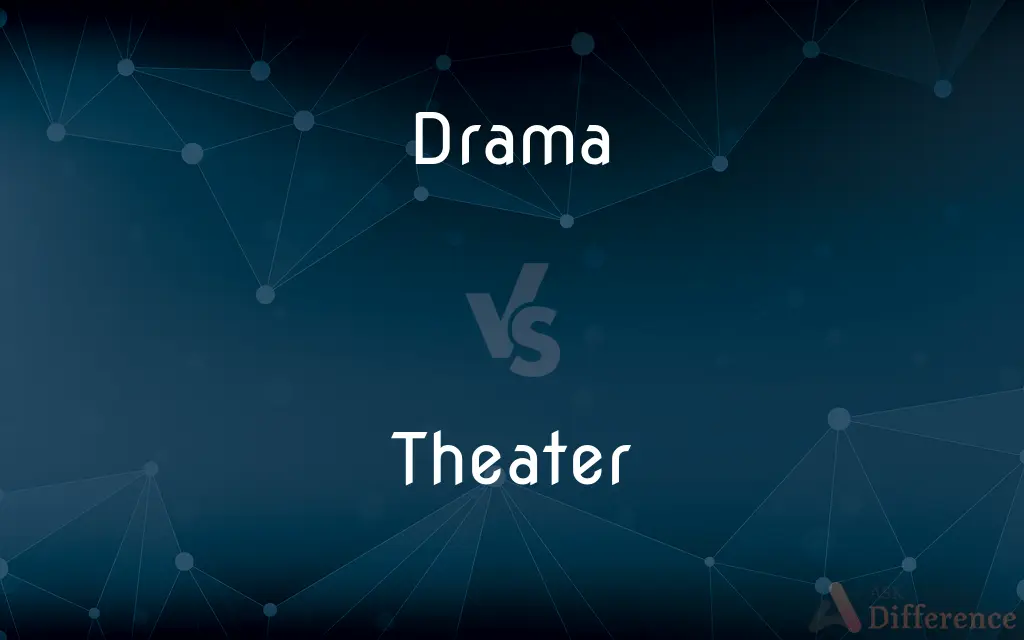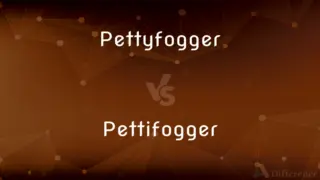Drama vs. Theater — What's the Difference?
By Tayyaba Rehman — Updated on September 19, 2023
Drama refers to a genre of literature or performance that depicts fictional or historical events, while theater is the venue or art of producing and staging plays. Drama is the content, theater is the form or place.

Difference Between Drama and Theater
Table of Contents
ADVERTISEMENT
Key Differences
Drama and Theater, though closely related, denote different aspects of performing arts. While both are essential to the world of stage and performance, they occupy distinct spaces.
Drama pertains primarily to the written text or storyline, consisting of dialogues, characters, and plot. It can be considered the backbone of any theatrical performance. A drama can be read silently or performed, emphasizing the narrative or conflicts.
Theater, on the other hand, is a broader term. It encompasses not just the written play but the entire production process. From direction, staging, lighting, and acting, everything falls under the theater's realm. Additionally, theater is also the physical space where plays are performed.
While drama focuses on the emotional and thematic content, theater is about bringing that content to life. Theatrical elements like set design, costumes, and props become essential in theater, enriching the drama's portrayal.
In essence, while a drama can exist independently in written form, theater is the manifestation of drama in the physical world, breathing life into the written words.
ADVERTISEMENT
Comparison Chart
Nature
Literary or performance genre.
Art form or venue for performances.
Focus
Narrative, characters, conflicts.
Production, presentation, and the place of performance.
Independence
Can exist as written text.
Requires a drama or play for performance.
Components
Dialogues, scenes, acts.
Stage, actors, props, lighting, direction.
Physical Presence
Can be intangible (as in a script).
Tangible, as it involves real-world staging and venues.
Compare with Definitions
Drama
A genre of literature depicting realistic or fictional events.
The drama portrayed the struggles of a young artist.
Theater
A room or hall for lectures with tiered seats.
The university's main theater can seat over a thousand students.
Drama
A play for theater, radio, or television.
Shakespeare's works remain some of the most celebrated dramas in history.
Theater
A building or outdoor area where plays and other dramatic performances are given.
The theater downtown is hosting a new play.
Drama
Emotional or unexpected series of events.
There's always some drama when the family gets together.
Theater
The writing and producing of plays.
She studied theater in college and dreams of directing one day.
Drama
Drama is the specific mode of fiction represented in performance: a play, opera, mime, ballet, etc., performed in a theatre, or on radio or television. Considered as a genre of poetry in general, the dramatic mode has been contrasted with the epic and the lyrical modes ever since Aristotle's Poetics (c.
Theater
A place or area of activity viewed as a scene of violent conflict.
War zones are often referred to as theaters of operation.
Drama
Character development and thematic depth in a story.
The film's drama was its strongest point, pulling at heartstrings.
Theater
A building, room, or outdoor structure for the presentation of plays, films, or other dramatic performances.
Drama
A play for theatre, radio, or television
A gritty urban drama about growing up in Harlem
Theater
A room with tiers of seats used for lectures or demonstrations
An operating theater at a medical school.
Drama
An exciting, emotional, or unexpected event or circumstance
A hostage drama
An afternoon of high drama at Wembley
Theater
Dramatic literature or its performance; drama
The theater of Shakespeare and Marlowe.
Drama
A prose or verse composition, especially one telling a serious story, that is intended for representation by actors impersonating the characters and performing the dialogue and action.
Theater
The milieu of actors and playwrights.
Drama
A serious narrative work or program for television, radio, or the cinema.
Theater
The quality or effectiveness of a theatrical production
Good theater.
Awful theater.
Drama
Theatrical plays of a particular kind or period
Elizabethan drama.
Theater
Dramatic material or the use of such material
"His summation was a great piece of courtroom theater" (Ron Rosenbaum).
Drama
The art or practice of writing or producing dramatic works.
Theater
The audience assembled for a dramatic performance.
Drama
A situation or succession of events in real life having the dramatic progression or emotional effect characteristic of a play
The drama of the prisoner's escape and recapture.
Theater
A place that is the setting for dramatic events.
Drama
The quality or condition of being dramatic
A summit meeting full of drama.
Theater
A large geographic area in which military operations are coordinated
The European theater during World War II.
Drama
A composition, normally in prose, telling a story and intended to be represented by actors impersonating the characters and speaking the dialogue
The author released her latest drama, which became a best-seller.
Theater
A place or building, consisting of a stage and seating, in which an audience gathers to watch plays, musical performances, public ceremonies, and so on.
Drama
Such a work for television, radio or the cinema (usually one that is not a comedy)
Theater
A region where a particular action takes place; a specific field of action, usually with reference to war.
His grandfather was in the Pacific theater during the war.
Drama
Theatrical plays in general
Theater
A lecture theatre.
Drama
A situation in real life that has the characteristics of such a theatrical play
After losing my job, having a car crash, and the big row with my neighbours, I don't need any more drama.
Theater
(medicine) An operating theatre or locale for human experimentation.
This man is about to die, get him into theater at once!
Drama
(slang) Rumor, lying or exaggerated reaction to life or online events; melodrama; an angry dispute or scene; a situation made more complicated or worse than it should be; intrigue or spiteful interpersonal maneuvering.
Theater
(US) A cinema.
We sat in the back row of the theater and threw popcorn at the screen.
Drama
A composition, in prose or poetry, accommodated to action, and intended to exhibit a picture of human life, or to depict a series of grave or humorous actions of more than ordinary interest, tending toward some striking result. It is commonly designed to be spoken and represented by actors on the stage.
A divine pastoral drama in the Song of Solomon.
Theater
Drama or performance as a profession or art form.
I worked in theater for twenty-five years.
Drama
A series of real events invested with a dramatic unity and interest.
Westward the course of empire takes its way;The four first acts already past,A fifth shall close the drama with the day;Time's noblest offspring is the last.
The drama and contrivances of God's providence.
Theater
Any place rising by steps like the seats of a theater.
Drama
Dramatic composition and the literature pertaining to or illustrating it; dramatic literature.
Theater
A conspicuous but unproductive display of action.
The Senate confirmation hearings were just theater.
Security theater
Drama
A dramatic work intended for performance by actors on a stage;
He wrote several plays but only one was produced on Broadway
Theater
An edifice in which dramatic performances or spectacles are exhibited for the amusement of spectators; anciently uncovered, except the stage, but in modern times roofed.
Drama
An episode that is turbulent or highly emotional
Theater
Any room adapted to the exhibition of any performances before an assembly, as public lectures, scholastic exercises, anatomical demonstrations, surgical operations, etc.
Drama
The literary genre of works intended for the theater
Theater
That which resembles a theater in form, use, or the like; a place rising by steps or gradations, like the seats of a theater.
Shade above shade, a woody theaterOf stateliest view.
Drama
The quality of being arresting or highly emotional
Theater
A sphere or scheme of operation.
For if a man can be partaker of God's theater, he shall likewise be partaker of God's rest.
Drama
A situation or series of events with intense conflict or contrast.
High school is filled with drama sometimes.
Theater
A place or region where great events are enacted; as, the theater of war.
Theater
A building where theatrical performances or motion-picture shows can be presented;
The house was full
Theater
The art of writing and producing plays
Theater
A region in which active military operations are in progress;
The army was in the field awaiting action
He served in the Vietnam theater for three years
Theater
The world of actors, playhouses, and the like.
He's been a part of the theater community for decades.
Common Curiosities
Are all dramas performed in theaters?
No, dramas can also be written to be read or adapted for television or radio.
Can a theater exist without drama?
While a theater venue exists physically, it requires dramas or plays to fulfill its purpose.
Can a drama be comedic?
Yes, dramas can be comedic, tragic, or a mix of tones.
Is drama always fictional?
No, dramas can be based on real events or historical figures.
Is Broadway a theater or a series of dramas?
Broadway refers to the theater district in New York and also the high-level theatrical productions performed there.
Why are some dramas called "soap operas"?
"Soap operas" originally referred to radio dramas sponsored by soap companies; now it denotes serialized daytime dramas.
Are open-air performances considered theater?
Yes, open-air venues are one type of theater setting.
What is a home theater?
A home theater refers to an entertainment setup in a home that mimics the movie theater experience.
Are movies considered drama?
Movies can belong to the drama genre, but not all movies are dramas.
What's the main purpose of a theater?
The primary purpose of a theater is to stage and present performances, especially plays.
What roles are vital for theater production?
Key roles include the director, actors, stage crew, lighting and sound technicians, among others.
Can real-life events be dramatized for theater?
Yes, many plays are based on real events, people, or historical episodes.
Are dramas only meant for adults?
No, dramas can be written for audiences of all ages.
What's the difference between a movie theater and a drama theater?
A movie theater screens films, while a drama theater is designed for live performances.
Can a drama change when performed in different theaters?
Yes, different productions, directors, and venues can offer varied interpretations of the same drama.
Share Your Discovery

Previous Comparison
Pettyfogger vs. Pettifogger
Next Comparison
Hex vs. CharmAuthor Spotlight
Written by
Tayyaba RehmanTayyaba Rehman is a distinguished writer, currently serving as a primary contributor to askdifference.com. As a researcher in semantics and etymology, Tayyaba's passion for the complexity of languages and their distinctions has found a perfect home on the platform. Tayyaba delves into the intricacies of language, distinguishing between commonly confused words and phrases, thereby providing clarity for readers worldwide.














































